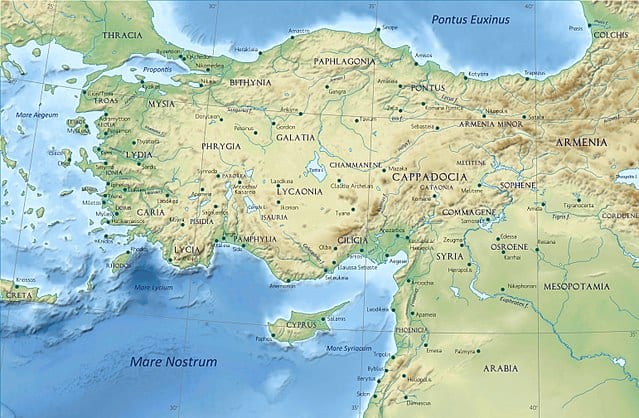
Turretinfan: the colorful, vociferous, and ever-anonymous Reformed Protestant anti-Catholic polemicist, wrote an article on Bishop James White’s blog, entitled, “Did the Acts 15 ‘Council’ Rely on the Exegesis of Scripture?” (2-18-12). I’d like to concentrate on one interesting claim that he made. His words will be in blue:
*****
IV. Is the Acts 15 Assembly Normative of Anything?
I’m grateful for the opportunity to look more closely into this council, which I have written about many times:
But I had never pondered this particular aspect of it, and now I am very pleased to do so, as this council is of great interest to me (as an evidence of Catholic ecclesiology and disproof of sola Scriptura).
First of all, a translation note: King James is cited for 15:23, and it reads, “they wrote letters by them after this manner;”. In other words, it’s implied that there were more than one, and the others were similar in nature or “manner” to what is recorded. Turretinfan appears not to notice this and immediately states: “So, what came out was a letter that was written to a particular group of Gentiles living in particular geographic areas“ (my bolding added).
In any event, this will form no part of my argument, since most translations refer to a single letter. For example, RSV (which is what I always use in my writing: “with the following letter”; similar in NIV and NASB). Logically speaking, simply referring to one letter does not mean that there could not be other letters as well. But this particular one (whether it was the only one, or one of several), was delivered at Antioch (15:30). Then we are informed that Paul and Silas “went through Syria and Cili’cia, strengthening the churches” (15:41). Thus, all three areas mentioned in 15:23 were indeed informed of this one decree, sent via letter with apostles.
But were those all the areas that Holy Scripture tells us were bound by the decrees of the council? The text that follows shows that this is not the case. Paul went next to “Derbe and to Lystra” (16:1). Derbe was in Asia Minor (current-day Turkey), and was then considered part of the region of Lycaonia. Granted, it wasn’t far from Cilicia, but it is a different locality. Lystra was a little north and west of Derbe.
Three verses later is a passage crucial to this discussion: one that Turretinfan (for reasons known only to himself) completely ignores in his fairly comprehensive treatment:
Acts 16:4-5 (RSV) As they went on their way through the cities, they delivered to them for observance the decisions which had been reached by the apostles and elders who were at Jerusalem. [5] So the churches were strengthened in the faith, and they increased in numbers daily.
Note that this was after St. Paul had visited two cities that were not part of the three regions mentioned with regard to the specific letter mentioned in Acts 15:22-29. And the broad, sweeping language sure implies (at least prima facie) that other local churches would be included also (“As they went on their way through the cities”). Moreover, the phrase, “the churches were strengthened in the faith” echoed the phrase, “strengthening the churches” (15:41), which was written in conjunction with the specific letter that we know about.
It is, therefore, quite reasonable to surmise either that 1) there were more letters of the sort that Acts 15:23 mentions, and/or 2) it was understood by St. Paul that he was to deliver the message of the decisions or decrees of the council, far and wide, in his travels. The rest of chapter 16 details the many places Paul and Silas visited, where (presumably), they “delivered to them for observance the decisions which had been reached . . . at Jerusalem.”
The places visited included Phrygia, Galatia, Troas (near the west of Turkey), Samothrace (an island in the Aegean Sea), Neapolis (in Greece), and Philippi (northern Greece). That’s a lot of places, across a wide geographical area (Turkey itself is 970 miles east to west, and Paul crossed the Aegean Sea into Greece).
We observe, then, that Paul was (by quite reasonable deduction and the grammar of these biblical texts), delivering binding conciliar decrees (“for observance”) across a very large area: far more than “a particular group of Gentiles living in particular geographic areas” (i.e., Antioch and Syria and Cilicia). No one need merely take my word and accept my argument in this respect. Several Protestant commentaries (for Acts 16:4-5) back me up:
Benson Commentary although these decrees were written in the form of a letter to the brethren of the Gentiles in Antioch, Syria, and Cilicia, they belonged equally to all the Gentile converts everywhere.
Barnes’ Notes on the Bible The decrees – τὰ δόγματα ta dogmata. The decrees in regard to the four things specified in Acts 15:20, Acts 15:29. The word translated “decrees” occurs in Luke 2:1, “A decree from Caesar Augustus”; in Acts 17:7 “The decrees of Caesar”; in Ephesians 2:15; and in Colossians 2:14. It properly means a law or edict of a king or legislature. In this instance it Was the decision of the council in a case submitted to it, and implied an obligation on the Christians to submit to that decision, since they had submitted the matter to them. The same principles, also, would be applicable everywhere, and the decision, therefore, at Jerusalem became conclusive. It is probable that a correct and attested copy of the letter Acts 15:23-29 would be sent to the various churches of the Gentiles.
Gill’s Exposition of the Entire Bible And as they went through the cities,…. Of Derbe, Lystra, and Iconium, and others in Lycaonia, and in Phrygia and Galatia; the Arabic version reads, “they both”; that is, Paul and Barnabas: they delivered them the decrees for to keep; they gave the churches, in these cities, the sentiments, and determinations to be observed and followed by them: that were ordained of the apostles which were at Jerusalem . . .
Matthew Henry Commentary He went through the cities where he had preached the word of the Lord, as he intended ch. 15:36 ), . . . All the churches were concerned in that decree, and therefore it was requisite they should all have it well attested.
Robertson’s Word Pictures in the New Testament
They delivered them (παρεδιδοσαν αυτοις — paredidosan autois). Imperfect active, kept on delivering to them in city after city. This is a proof of Paul‘s loyalty to the Jerusalem compact (Knowling). The circumcision of Timothy would indicate also that the points involved were under discussion and that Paul felt no inconsistency in what he did.
The decrees (τα δογματα — ta dogmata). Old word from δοκεω — dokeō to give an opinion. It is used of public decrees of rulers (Luke 2:1; Acts 17:7), of the requirements of the Mosaic law (Colossians 2:14), and here of the regulations or conclusions of the Jerusalem Conference. Silas was with Paul and his presence gave added dignity to the passing out of the decrees, a charter of Gentile freedom, since he was one of the committee from Jerusalem to Antioch (Acts 15:22, Acts 15:27, Acts 15:32).
Which had been ordained (τα κεκριμενα — ta kekrimena). Perfect passive articular participle of κρινω — krinō to judge, emphasizing the permanence of the conclusions reached by the apostles and elders in Jerusalem.
For to keep (πυλασσειν — phulassein). This present active infinitive likewise accents that it is a charter of liberty for continual living, not a temporary compromise.
Expository Notes with Practical Observations on the New Testament To whom these decrees were delivered; namely, to the churches, as they passed along through the several cities; so many cities, so many churches: the whole company of Christians within a city and the adjacent territory, . . .
***
*
***
*
Photo credit: Caliniuc since Putzger & Westermann atlases (Atlas zur Weltgeschichte, Stier, H.E., dir., 1985), 7-27-11. Asia Minor in the Greco-Roman period (332 BC – 395 AD) [Wikimedia Commons / Creative Commons Attribution-Share Alike 4.0 International license]
***













